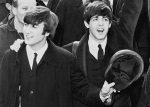Lennon or McCartney? Scientists Use Artificial Intelligence to Figure Out Who Wrote Iconic Beatles Songs

Do you agonize over the fact that you don’t know for certain who wrote what percentage of your favorite Beatles songs? Do you need to know if a line or phrase is Lennon or McCartney’s before you can enjoy “A Hard Day’s Night,” “In My Life,” and other timeless tunes? Have you lost sleep over the disputed authorship of “Do You Want to Know a Secret”?
I hope not. As Lennon/McCartney themselves wrote, in the end, the songs we love are equal to the love we give the songs…. or something like that. How much we can say with certainty who penned which lyric or melody or played which riff or rhythm part doesn’t add to our emotional experience. But that knowledge does add more to our appreciation than fodder for forum wars or lawsuits.
Pulling these iconic songs into their constituent parts helps confirm our understanding of how those parts contributed differently to making the whole evolve; how Lennon’s directness and simplicity complemented and contrasted with McCartney’s use of “more non-standard musical motifs” and a higher degree of complexity. Or, at least, that’s what an AI found when it analyzed hundreds of Beatles hits in an effort to “build a ‘musical fingerprint’ for each songwriter,” reports Alex Matthews-King at the Independent.
After putting the machine learning algorithm through an initial training phase of “listening” to a complete works, researchers at Harvard “asked” the program to assess “iconic songs, or musical fragments, recorded between 1962 and 1966, where debate rages over who was the major influence.” Much of that debate has been fueled by the songwriters themselves, whose memories in interviews conflict, but who are generally thought to have written most songs individually under their joint songwriting partnership.
The scientists from Harvard and Dalhousie University in Canada were able to gauge with somewhere around 76 percent accuracy whether songs or parts of songs were written by Lennon or McCartney. (Spoiler alert: The AI "was able to identify some, including 'Ask Me Why', 'Do You Want to Know a Secret' and the bridge to 'A Hard Day's Night', as belonging to John Lennon with up to 90 per cent certainty," writes The Daily Mail.) Senior lecturer in statistics at Harvard and paper author Mark Glickman explains the larger purpose of the project to the Financial Times: “Our work is essentially a blueprint for those wanting to follow changes in music over time. Using our machine learning model, you could potentially home in on all the different influences of a given musician.”
If you’re using their work to win arguments, be prepared to explain how the study obtained its results and why they are any more reliable than decades of detective work and expert listening by humans. As a non-statistics person, I’ll leave that explanation to more qualified individuals. I’m satisfied: whether McCartney wrote all of the music for “In My Life” or just the bridge, as Lennon claimed, won’t change the way it moves me one bit.
Related Content:
A Brief History of Sampling: From the Beatles to the Beastie Boys
Josh Jones is a writer and musician based in Durham, NC. Follow him at @jdmagness
Lennon or McCartney? Scientists Use Artificial Intelligence to Figure Out Who Wrote Iconic Beatles Songs is a post from: Open Culture. Follow us on Facebook, Twitter, and Google Plus, or get our Daily Email. And don't miss our big collections of Free Online Courses, Free Online Movies, Free eBooks, Free Audio Books, Free Foreign Language Lessons, and MOOCs.
from Open Culture https://ift.tt/2LLJS4W
via Ilumina
Comments
Post a Comment